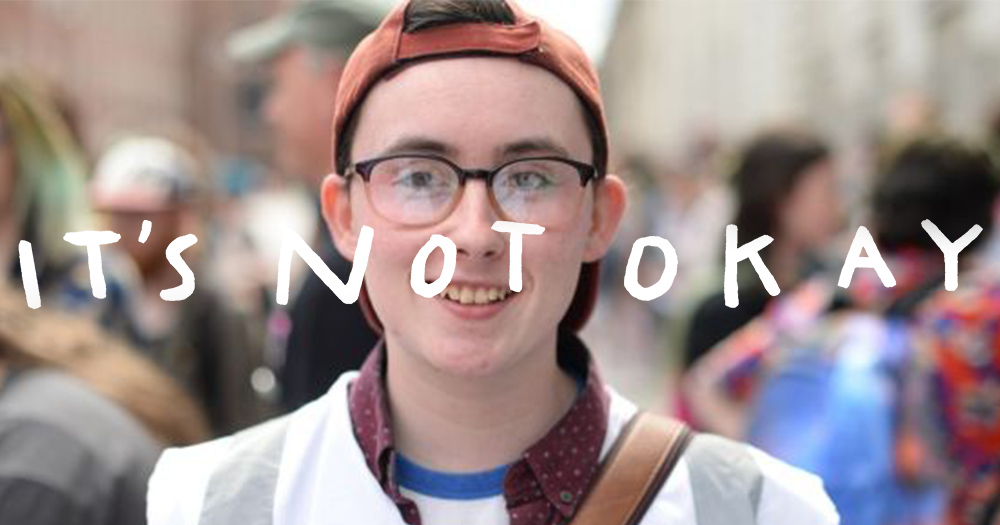Cameron Keighron came out as transgender in 2013. While he received support from his family and friends, cruel threats he received online made a huge impact. Cameron shared his story as part of the Call It Out campaign.
A joint initiative of the Transgender Equality Network (TENI) and the Hate and Hostility Research Group of the University of Limerick (HHRG), the campaign aims to highlight the continued harassment and abuse directed towards LGBT+ people, and encourage all members of the population to call out any and all instances of bigotry.
https://twitter.com/TENI_Tweets/status/1131888863444709376
“When I started medically transitioning and socially transitioning and changing my name and my gender marker, I wanted to put some of this stuff up on my social media to show other young trans people…how to do it and to bring some positive visibility to transgender and non binary identities.”
The response from family and friends was overwhelmingly positive, with people commenting how much they supported Cameron. Time went by and Cameron forgot about the post until one day, while in a shopping centre with people from a conference he was attending, he received a notification.
“I didn’t recognise the profile, so I clicked into it and the comment said, ‘I hope you die’. [I was] just standing there in complete shock and crying and telling these people that I’d only recently met that someone thought my identity was so disgusting to them that they hoped I died.”

Cameron deleted the comment, blocked the account and reported it to the police. There was nothing the guards could do except note it. There were no provisions to stop the person.
Time went by and Cameron received another notification. “They told me on this comment that I should kill myself and that I was a disgusting freak of nature and how could any organisation want me to work with them.”
“This person was someone who had access to my life, who knew who I was, knew who I worked for. I have to walk into work thinking about whether or not it’s today that this person decides that online abuse isn’t good enough and they want to say something in person or physically attack me…I’d never felt that level of fear for being who I am.”
Apologies for the language on display, but during the week we've been running our national #CallItOut campaign about homophobia, biphobia and transphobia, we've got some choice messages showing support and need for the campaign!! pic.twitter.com/BrUc4qPLdE
— TENI (@TENI_Tweets) May 24, 2019
When Cameron shared the situation with his mother, she was visibly upset, which compounded the pain. “Not only was it affecting me, it was affecting my family.” When Cameron had come out as trans, his sister’s worry was for his safety, that he wouldn’t be hurt or attacked because of being trans. Cameron sadly shares, “I can’t tell her that that won’t happen.”
Cameron discussed the impact of those negative comments: “It changed me both positively and negatively. I stopped talking about transitioning, I stopped talking about who I was. I was wary of speaking out.
“I realised I didn’t want them to win in this situation…this is why we should speak out, this is why we should be visible in our community. This is happening all the time and if we don’t speak up against it then it’s going to continue to happen and no one is going to think it’s a problem.”
“It was a comment online, but I’m going to remember that comment for the rest of my life. Nothing can ever change that but I can change how I respond to it.”
For more information visit Call It Out. Homophobia, transphobia and biphobia are not acceptable – It’s Not Okay.
© 2019 GCN (Gay Community News). All rights reserved.
Support GCN
GCN is a free, vital resource for Ireland’s LGBTQ+ community since 1988.
GCN is a trading name of National LGBT Federation CLG, a registered charity - Charity Number: 20034580.
GCN relies on the generous support of the community and allies to sustain the crucial work that we do. Producing GCN is costly, and, in an industry which has been hugely impacted by rising costs, we need your support to help sustain and grow this vital resource.
Supporting GCN for as little as €1.99 per month will help us continue our work as Ireland’s free, independent LGBTQ+ media.

comments. Please sign in to comment.